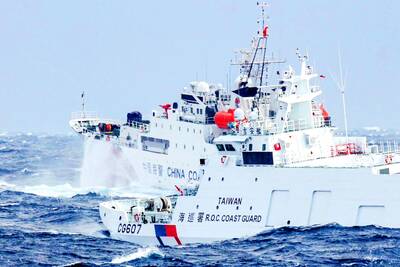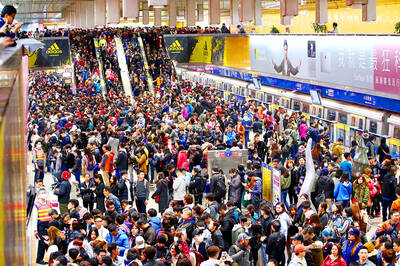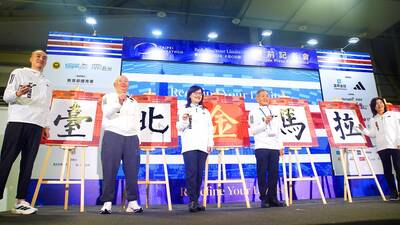Since the implementation of the plastic bag reduction program in 2006, 1.44 billion plastic bags have been recycled annually, and the usage of plastic bags nationwide has been reduced by 2 billion per year, the Environmental Protection Administration (EPA) said yesterday.
“Taiwan is the first country in the world that is implementing plastic recycling as a nation-wide program,” said Ho Soong-chin (何舜琴), director-general of the EPA’s department of Solid Waste Control.
Prior to the program, the number of plastic bags used annually was 20 billion, Ho said, which meant that each Taiwanese on average used 2.5 plastic bags a day.
Since the imple儉mentation of the program — which banned free plastic bags at government agencies, department stores, malls, supermarkets and convenience stores — the number of bags used in those sectors decreased from 3.43 billion to 1.4 billion, she said.
In response to a reporter noting that, even with 1.44 billion bags collected annually, the recycling rate for plastic bags was still a low 7 percent, Ho said the seemingly low figure was steadily increasing.
“It is also indisputable that since the implementation of the reduction and recycling program the number of plastic bags used has decreased significantly [in the sectors regulated],” she said.
Two methods were employed for the processing of bags, Ho said.
“With the dry method, relatively clean plastic bags are first melted, then made into plastic pebbles, which are the raw materials for recycled plastic products,” she said.
The wet method uses an additional breaking and cleaning process before melting the bags, making it capable of processing bags that contain grease or dirt, she said.
Though over 80 percent of cities and counties now practice plastic bag recycling, not all areas have the wet recycling technology, Ho said.
“If you live in a city or county that can only deal with dry bags, all dirty bags must go into the regular trash and get incinerated,” she said.
Another problem is that not all plastic bags are recyclable, Ho said.
“Bags that include aluminum or other materials, such as keep-fresh packaging commonly seen in potato chip products, tea leaves, coffee beans or frozen foods, are not recyclable,” she said.
Calling on the public to distinguish unrecyclable materials from recyclable polyethylene bags, Ho said that correct sorting would help decrease the work time of garbage collectors and alleviate them from additional burdens.

READY: The CGA said it closely monitored China’s maritime exercise, deployed vessels to shadow the Chinese ships one-on-one and set up emergency response centers Chinese navy and coast guard ships have returned to China, signaling the end of a massive maritime exercise, authorities said yesterday. The Coast Guard Administration (CGA) released images it said showed Chinese vessels sailing north in rough seas past Taiwan on Thursday, on their way to China. “All the Chinese coast guard went back to China yesterday, so although they have not officially made any announcement, we consider it over,” CGA Deputy Director-General Hsieh Ching-chin (謝慶欽) said. Beijing has not confirmed the drills and the Chinese Ministry of National Defense did not say whether the maneuvers had taken place when asked at a

People can take the Taipei MRT free of charge if they access it at Nanjing Sanmin Station or Taipei Arena Station on the Green Line between 12am and 6am on Jan. 1, the Taipei Department of Transportation said on Friday, outlining its plans to ease crowding during New Year’s events in the capital. More than 200,000 people are expected to attend New Year’s Eve events in Taipei, with singer A-mei (張惠妹) performing at the Taipei Dome and the city government’s New Year’s Eve party at Taipei City Hall Plaza, the department said. As people have tended to use the MRT’s Blue or

PUBLIC TRANSPORT: As some roads would be fully or partially closed, people are advised to take the MRT, with services expanded to accommodate more riders This year’s Taipei Marathon, which has obtained its first gold label certification from World Athletics, is to be held from 5am to 1pm tomorrow and would have 28,000 participants. The race is to start from the Taipei City Plaza and would go through major roads throughout the city, with traffic control implemented from 6am to 2pm, officials said. The Taipei Mass Rapid Transit (MRT) system and New Taipei City MRT Circle line would start operating at 5am on the day of the race, they said. The race would cover Renai Road, Xinyi Road, Hangzhou S Road, Aiguo east and west roads,

Taipei is participating in Osaka’s Festival of Lights this year, with a 3m-tall bubble tea light installation symbolizing Taiwan’s bubble tea culture. The installation is designed as a bubble tea cup and features illustrations of Taipei’s iconic landmarks, such as Taipei 101, the Red House and North Gate, as well as soup dumplings and the matchmaking deity the Old Man Under the Moon (月下老人), affectionately known as Yue Lao (月老). Taipei and Osaka have collaborated closely on tourism and culture since Taipei first participated in the festival in 2018, the Taipei City Department of Information and Tourism said. In February, Osaka represented